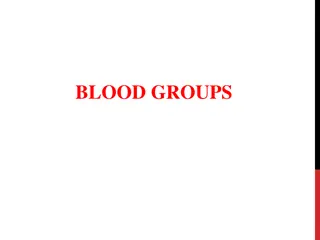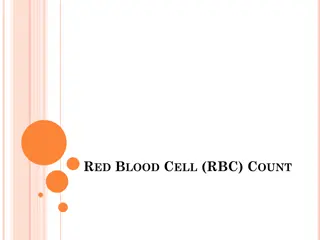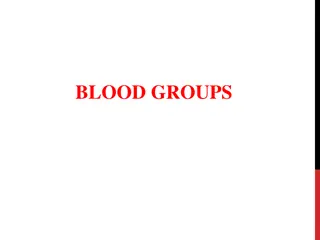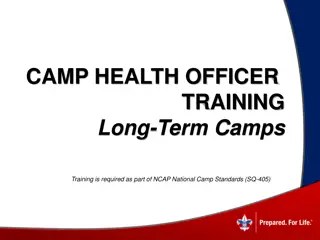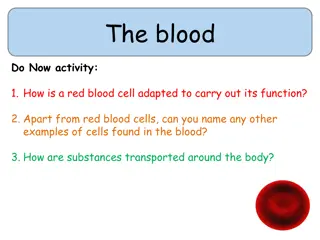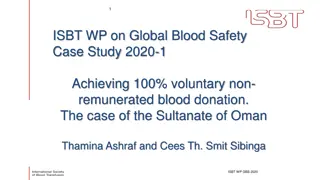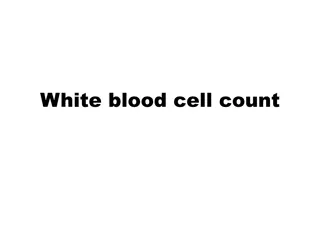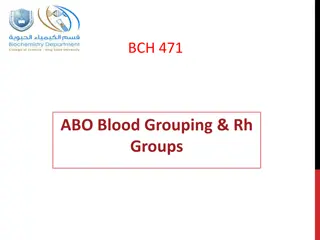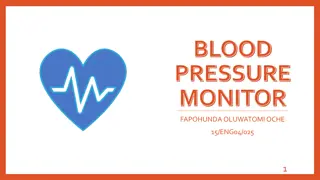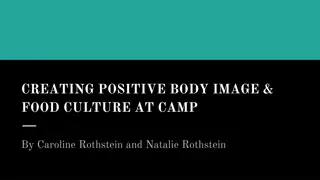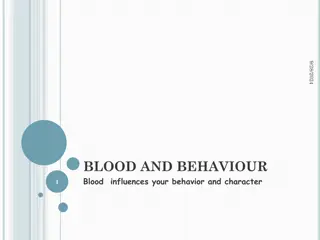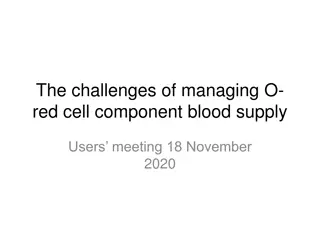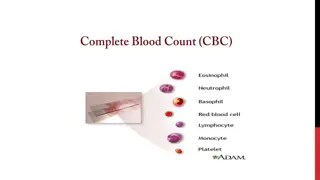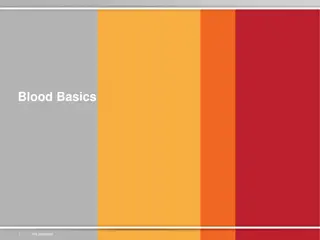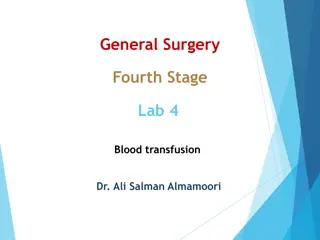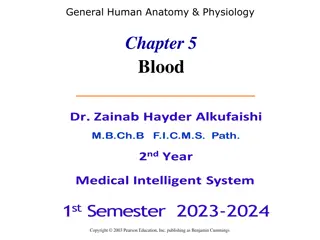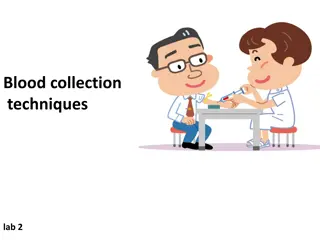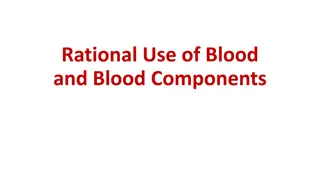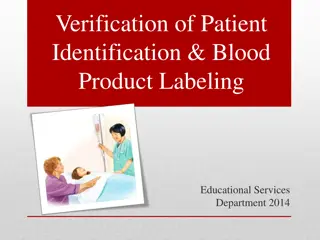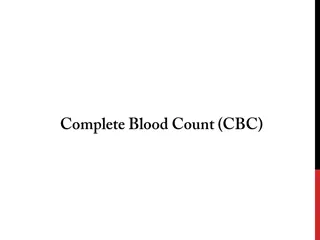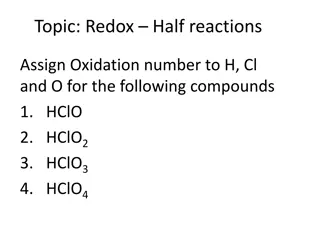Transfusion
Blood transfusion is a crucial medical procedure worldwide, with various components like packed red blood cells, plasma, platelets, and cryoprecipitate being utilized for efficient use. Differential centrifugation is employed for component preparation, ensuring precise separation of red blood cells,
2 views • 45 slides
Differential white blood cell count
Differential white blood cell count, also known as a leukocyte count, is a crucial test to determine the different types of white blood cells present in the blood. The cells are classified into granulocytes (neutrophils, eosinophils, basophils) and agranulocytes (lymphocytes, monocytes). Blood smear
3 views • 21 slides
Understanding Human Blood Groups and Genetics
Human blood groups are determined by the presence or absence of specific antigens and antibodies. The ABO system categorizes blood into four types (A, B, AB, O), while the Rh factor (D antigen) determines whether blood is RhD positive or negative. Blood group antigens are crucial for safe transfusio
2 views • 14 slides
Understanding How Diabetes Affects Blood Vessels
Diabetes can harm blood vessels, leading to complications due to high blood sugar levels. Hemoglobin A1c plays a crucial role in monitoring glucose control, with values above 6.5% indicating diabetes. Over time, high blood sugars can damage blood vessels, affecting blood flow and increasing the risk
1 views • 19 slides
Understanding Half-Life in Physics
Half-life is a key concept in physics, particularly in radioactive decay. It is the time taken for the activity of a radioactive source to decrease to half of its original value. This can be determined experimentally through measuring counts per minute and graphing the data. Additionally, half-life
2 views • 11 slides
Understanding Red Blood Cell (RBC) Count and Its Significance in Blood Health
Red blood cells, comprising nearly 45% of blood volume, play a crucial role in oxygen transport. The red blood cell count, measured as the number of cells per unit volume of blood, helps assess the adequacy of oxygen-carrying capacity. Normal values vary by age and gender. The experiment aims to det
8 views • 16 slides
Understanding the Components of Blood for Better Health
Explore the main components of blood such as red blood cells, white blood cells, platelets, and plasma. Learn how these components function, their percentages in blood, and how they impact human health. Discover the importance of blood donation and how changes in blood composition can affect overall
2 views • 19 slides
Understanding Blood Groups and Their Significance
Human blood types are determined by specific antigens and antibodies present on red blood cells, influencing crucial aspects like blood transfusions and familial relationships in forensic medicine. The ABO system, with its four main blood types (A, B, AB, O), plays a vital role in categorizing blood
7 views • 14 slides
Camp Health Officer Training Overview
Camp Health Officer Training is a crucial requirement for long-term camps to adhere to NCAP National Camp Standards. This training covers the roles, responsibilities, and duties of the Camp Health Officer (CHO) before, during, and after camp. Participants will learn about managing the health lodge,
5 views • 75 slides
Understanding Blood Cells and Transport Mechanisms
Your blood, consisting of red blood cells, white blood cells, platelets, and plasma, plays a crucial role in transporting substances like oxygen, nutrients, and waste products throughout your body. Red blood cells are specialized for oxygen transport due to their unique adaptations, while white bloo
2 views • 18 slides
Achieving 100% Voluntary Non-Remunerated Blood Donation in Oman
In the Sultanate of Oman, the Department of Blood Services has successfully moved towards 100% Voluntary Non-Remunerated Blood Donation (VNRBD), focusing on motivating the public to donate blood regularly. This shift has led to a significant increase in blood donations from 2007 to 2011, with a grow
1 views • 26 slides
Understanding White Blood Cell Count and Measurement Methods
White blood cell count measures the number of white blood cells in a specific volume of blood, indicating infection or disease progression. The normal range is 5000-11000 cells/cubic mm, varying with age. Methods include manual and electronic counting using specific instruments. Materials like antic
0 views • 14 slides
Streamlining Camp Data Import Process from Blackpug to Scoutbook
Detailed guide on importing Camp Alpine 2019 data from Blackpug to Scoutbook, including steps like logging in, selecting weeks, installing browser extension, and downloading the CSV file for import. Note: Manual entry required for base camp activities.
0 views • 13 slides
Understanding ABO Blood Grouping and Rh Groups
ABO blood grouping and Rh factor testing are crucial for blood transfusions and forensic medicine. The presence or absence of specific antigens and antibodies in human blood determines blood type. Genetic inheritance from parents establishes blood type, with codominance influencing offspring phenoty
0 views • 13 slides
Promoting Emotional Safety and Well-being at Happy Campers
Happy Campers, led by Marcel Horowitz, MS, MCHES, focuses on creating a positive camp experience for children in Yolo County. The camp emphasizes the value of finding partners, the importance of emotional safety, and the impact of feeling good on campers' experiences. Addressing factors like sleep,
0 views • 10 slides
Best Practices for Camp Leaders: Ensuring Safety and Creating a Positive Environment
Discover essential guidelines for camp leaders to demonstrate God's love while prioritizing the safety and well-being of campers. Topics include safety protocols, code of conduct, handling bed-wetting incidents, addressing sleepwalking and night terrors, dealing with stealing, and the roles of camp
0 views • 21 slides
Camp Summit in Paradise: A Haven for Personal Growth and Adventure
Camp Summit in Paradise is a residential camp for individuals with special needs, offering a transformative experience of independence and growth through various activities. With a focus on personal development, social skills, and team building, the camp provides a rare respite for families and care
0 views • 7 slides
Understanding Blood Components and Their Administration
Effective blood transfusion therapy relies on the availability and proper administration of various blood components. Separating blood components allows for better patient care by matching transfusions to individual needs and avoiding unnecessary components. Different blood products like packed red
1 views • 27 slides
Understanding the Transition to Half-Ice Hockey for Novice Players
This content discusses the transition from full ice to half ice for Novice players in hockey, as mandated by Hockey Canada for the 2019-2020 season. It highlights the benefits of the half-ice program in developing fundamental hockey skills and enhancing player engagement. Various experts share insig
0 views • 28 slides
Understanding Blood Pressure Monitoring
Blood pressure monitoring is essential for maintaining overall health. This article explores the significance of blood pressure, the importance of monitoring it, and the methods used to measure blood pressure. It also delves into the clinical need for accurate blood pressure monitoring devices and t
0 views • 22 slides
Exploring Positive Body Image and Food Culture at Camp
Explore themes surrounding body image and food culture at camp, understanding how these impact campers and staff. Learn to make positive shifts in camp culture, addressing disordered eating and emotional eating. Discover the intersection of food and body image, challenges faced, promoting body posit
0 views • 15 slides
Versiti Blood Center of Illinois: Community Impact through Blood Drives
Versiti Blood Center of Illinois, a nonprofit organization, plays a vital role in healthcare by organizing blood drives to ensure a sufficient supply of blood for hospitals in the Chicagoland and Northwest Indiana area. Through employee engagement, community outreach, and raising awareness about the
0 views • 10 slides
Computer Sciences Summer Camp Orientation Information
This orientation information provides details about the upcoming Computer Sciences Summer Camp organized by Dr. Phil Chan, with camp assistants Daniel Campos and Jesse Torres. The schedule includes arrival time, lunch details, dismissal, and a special Oscars event to showcase student projects. Instr
0 views • 27 slides
Blood Types and Personality Traits - Insights into Behavior and Character
Blood types O, A, and B are associated with specific personality traits and behaviors. Those with blood type O are characterized by confidence, honesty, and optimism. Blood type A individuals tend to be perfectionists, sensitive, and pessimistic. Blood type B individuals are creative, expressive, an
0 views • 10 slides
Challenges in Managing O- Red Cell Component Blood Supply
Addressing the challenges of managing O- red cell component blood supply involves considerations such as compatibility rules, absolute and relative indications, EBA benchmark comparisons, data monitoring, case studies, D variant specifications, and recommendations for transfusions. The supply side c
0 views • 39 slides
Japanese Cultural Camp at Waiora Scout Camp - May 16th to 17th, 2015
Experience a two-day Japanese cultural camp filled with activities like traditional games, workshops, and food at Waiora Scout Camp. Meet new people, practice Japanese language, and deepen your understanding of Japan in a fun environment. Stay prepared with the to-bring list provided for a memorable
0 views • 5 slides
Understanding Complete Blood Count (CBC) Test
Complete Blood Count (CBC) is a panel of tests that evaluates different types of blood cells, including red blood cells, white blood cells, and platelets. CBC helps diagnose various blood disorders and monitor conditions that affect blood cells, such as anemia or infections. The test is ordered base
0 views • 20 slides
Grover Underwood: Profile of a Satyr from Camp Half-Blood
Grover Underwood, also known as Grove, is a satyr residing in Camp Half-Blood, Long Island, NY. He works as a searcher and keeper of demi-gods, ensuring their safe return to camp. His beliefs align with various Greek deities, and he values protecting the natural environment. Grover is single and int
0 views • 21 slides
Tidewater Council BSA Camp Card Training Webinar & Campership Opportunities
The Tidewater Council BSA introduces new Camp Card opportunities for 2022, offering Scouts the chance to win a week of camp through sales. Learn about the Camp Card program, sales benefits, and important dates for participation, including details on how to enter the drawing for camperships. Don't mi
0 views • 16 slides
Understanding the Basics of Blood and Transfusions
Blood is a vital tissue that performs essential functions like delivering oxygen and nutrients, maintaining immunity, and controlling body temperature. Blood transfusions save lives by treating accident victims, transplant recipients, cancer patients, and those with blood-related diseases. Component
0 views • 20 slides
Blood Transfusion in Surgery: Types and Indications
Blood transfusion plays a crucial role in surgery, with different blood products such as whole blood, packed red cells, fresh-frozen plasma, cryoprecipitate, and platelets being used based on specific needs. Understanding the indications and proper handling of blood products is essential for safe tr
0 views • 13 slides
Overview of Blood and Hematology: Functions and Composition
The human body consists mostly of water, with blood making up approximately 8% of body weight. Blood is composed of plasma and formed elements, including red blood cells (erythrocytes), white blood cells (leukocytes), and platelets. Plasma, the liquid part of blood, contains various proteins such as
0 views • 12 slides
Understanding Blood: Composition and Functions
Blood is a vital fluid tissue in the human body, classified as a connective tissue. It consists of living cells known as formed elements suspended in a non-living matrix called plasma. The physical characteristics of blood, such as color range, pH level, and temperature, play crucial roles in mainta
0 views • 33 slides
Comprehensive Guide to Blood Collection Techniques in Medical Investigations
Blood collection is a crucial process in medical investigations where blood is withdrawn from patients for analysis. Methods include arterial sampling, venipuncture, and fingerstick sampling, each serving specific purposes. Venous blood is preferred over arterial blood due to accessibility and ease
0 views • 10 slides
Rational Use of Blood and Blood Components in Healthcare
Rational use of blood and blood components is crucial in healthcare settings to maximize resources, minimize risks, and enhance patient outcomes. This involves avoiding unnecessary transfusions, understanding the risks associated with transfusions, dispelling misconceptions, and choosing the most ap
0 views • 32 slides
Importance of Verification for Patient Identification & Blood Product Labeling in Medical Procedures
This educational program emphasizes the crucial role of verifying patient identification and blood product labeling in medical settings. It covers the significance of accurate verification, policy expectations, and the process for ensuring patient safety during blood product administration. The prog
1 views • 30 slides
Understanding Blood Group and Cross Matching in Transfusion Medicine
Blood group and cross matching play crucial roles in determining blood compatibility for transfusion. The presence or absence of specific antigens on red blood cells, along with antibody reactions, help identify blood types and ensure safe transfusions. Cross matching involves testing donor and reci
0 views • 8 slides
Exciting Camp Schedule and Activities by Lois Delcambre
Engage in a variety of enriching threads at camp, including Cryptography, CS/Programming, Policy, and Filmmaking. Explore Crypto, CS/Programming, Policy, and Filmmaking individually, alongside camp-wide events, video deadlines, and all-camp activities. Get ready for an immersive and dynamic camp exp
0 views • 9 slides
Understanding Complete Blood Count (CBC) Testing
Complete Blood Count (CBC) is a crucial test that provides information about the composition of a patient's blood, including red blood cells, white blood cells, and platelets. This test helps in diagnosing conditions such as anemia, infections, and more. CBC involves analyzing parameters like RBC co
0 views • 20 slides
Understanding Redox Half Reactions: Assigning Oxidation Numbers and Half-Reactions
In this content, we explore assigning oxidation numbers to elements in compounds such as HClO, HClO2, HClO3, and HClO4. We then delve into the Haber Process to understand redox reactions. The concept of oxidation and reduction, as well as the significance of electrons in these reactions, is illustra
0 views • 20 slides


